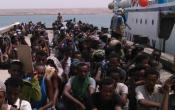Djibouti
Operation: Djibouti
Location
{"longitude":42,"latitude":12,"zoom_level":7}
Latest update of camps and office locations 21 Nov 2016. By clicking on the icons on the map, additional information is displayed.
Key Figures
| 2017 planning figures | |
| 100% | of known SGBV survivors falling within the mandate of the Office will receive appropriate support |
| 96% | of the refugee population will be vaccinated against measles |
| 90% | of primary school-aged refugee children will be enrolled in primary education |
| 80% | of national legislation relating to refugees will be made consistent with international standards |
| 10% | of people of concern (18-59 years) will have their own income generating solutions or be self-employed for more than 12 months |
| 20 | litres of potable water will be made available per person per day |
| 2015 end-year results | |
| 100% | of people of concern under UNHCR’s care and maintenance programme were registered |
| 100% | of people of concern had access to health care services in the camps, as well as to public hospitals through referrals. |
| 97% | of people of concern were immunized against measles, and the rate of global acute malnutrition fell from about 18 per cent in 2014 to 11 per cent in 2015 |
| 2,950 | refugee children of primary school age (88 per cent) were enrolled in school |
| 16 | litres of potable water available in camps per person per day on average |
Latest Updates and Related Links
People of Concern
10%
Decrease in
2015
2015
| 2015 | 22,006 |
| 2014 | 24,362 |
| 2013 | 23,810 |

[["Refugees",19365],["Asylum-seekers",2641]]
Loading ...
Budgets and Expenditure for Djibouti
< Back
2015
{"categories":[2012,2013,2014,2015,2016,2017],"budget":[26.92291952,26.23853782,26.95790235,41.39620267,31.98783036,33.785056452],"expenditure":[8.19790231,7.57613705,7.38017953,10.5087068,null,null]}
{"categories":[2012,2013,2014,2015,2016,2017],"p1":[26.92291952,26.23853782,26.95790235,41.39620267,31.98783036,33.785056452],"p2":[null,null,null,null,null,null],"p3":[null,null,null,null,null,null],"p4":[null,null,null,null,null,null]}
{"categories":[2012,2013,2014,2015,2016,2017],"p1":[8.19790231,7.57613705,7.38017953,10.5087068,null,null],"p2":[null,null,null,null,null,null],"p3":[null,null,null,null,null,null],"p4":[null,null,null,null,null,null]}
Loading ...
CHOOSE A YEAR
- 2015
- 2016
- 2017
Working environment
In Djibouti, some 37 per cent of the population lives below the poverty line and unemployment levels are at up to 60 per cent, depending on the region. In this difficult environment, Djibouti hosts over 24,000 refugees, primarily Somalis and Yemenis, but also other nationalities including Eritreans and Ethiopians.Given the lack of resources in the country, refugees depend solely on humanitarian aid. Access to farmland and drinking water remain major issues of concern. The Kenyan education curriculum (English) used in camp schools is not recognized by the Government of Djibouti nor that of Somalia. In public hospitals refugees are not considered as “vulnerable”; as a result refugees’ medical fees must be fully covered by UNHCR. Refugee status determination (RSD) procedures require strengthening to ensure sustainable processing of asylum claims.
Key priorities
In 2017, UNHCR operation in Djibouti will focus on: • Continuing life-saving interventions, with an emphasis on health/nutrition, shelter, education, prevention and response to SGBV, water management, and services for those with specific needs;
• advocating for the inclusion of refugees in national education and health systems:
• advocating the adoption and implementation of a national law on refugees;
• promoting durable solutions, including voluntary repatriation, resettlement and local integration;
• Strengthening the capacity of government mechanisms for refugee status determination (RSD); and
• encouraging the Government of Djibouti to engage further in the Khartoum process to address the root causes and ensure adequate management of mixed migration





